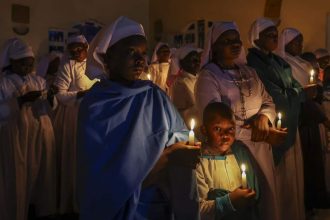With numerous children in Nigeria facing disrupted education, addressing the learning crisis in the country is paramount.
Learning crisis is particularly acute in Nigeria, with a significant portion of children lacking access to quality education and cannot read nor write well.
Stakeholders across sectors are therefore, rallying to implement innovative solutions and policy reforms aimed at ensuring every child has the opportunity to learn and thrive.
The United Nations Children Fund (UNICEF) recently said over 75 percent of children aged seven to 14 years in Nigeria cannot read simple sentence or solve basic Mathematics.
However, the Executive Secretary of the Universal Basic Education Commission (UBEC), Dr. Hamid Bobboyi, recently said Nigeria is experiencing a severe learning crisis that requires immediate action to address.
Bobboyi who spoke at a two-day stakeholders “dialogue on reading knitiative in the UBE Programme and the use of Mother Tongue/Language of immediate environment as Medium of Instruction,” said that if the learning crisis is not immediately addressed, it would hinder Nigeria from achieving the Sustainable Development Goals, SDGs.
Citing a report by the National Bureau of Statistics, NBS, and the United Nations Children’s Fund, UNICEF, the UBEC Boss said approximately three out of four children of basic education age, 6 to 14 years, in Nigeria cannot read a text with understanding, or solve simple mathematics problems.
“Several interventions by the Federal Government, State Governments and International Development Partners have been made to address the endemic issue. However, in spite of the huge resources expended, the challenge remains.
“Several factors, such as lack of access to instructional materials, especially on() the language of the immediate environment, poor teaching quality, insufficient parental guidance and lackadaisical attitude of States towards implementing the language policy on the use of mother tongue/ language of immediate environment as medium of instruction in the lower classes in Basic Education, are responsible for this,” he said.
Also speaking, the Executive Secretary of Nigeria Educational Research and Development Council, NERDC, Prof. Ismail Junaidu, called for the implementation of the National Language Policy.
Junaidu disclosed that the policy, which prescribes the use of mother tongue or language of immediate environment as medium of instruction in basic schools was approved in 2022 and allows the use of mother tongue to teach even up to primary six.
On his part, UNICEF Education Manager, Munamuzunga Sikaulu, stressed that Nigeria’s exit from the learning crisis will be a product of actions, while calling on stakeholders to come up with ideas that will help the delivery of basic education to the Nigerian child.






